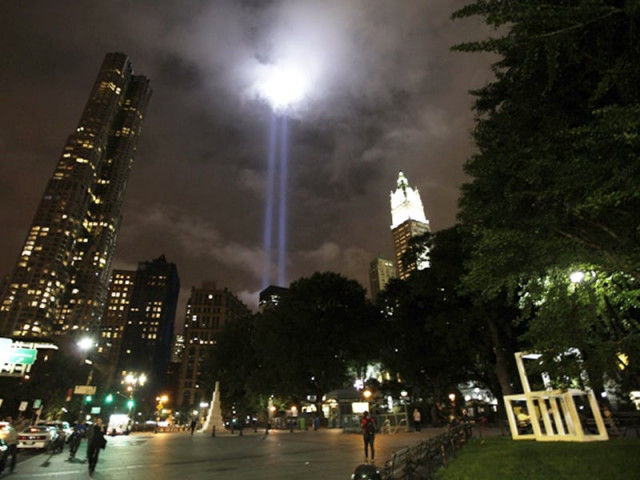The impact of September 11
Pakistani arts in the new millennium are embedded with remnants of the 9/11 tragedy.

The impact of September 11
There can be no doubt as to how cataclysmic September 11, 2001 has been for the world, and more so for Pakistan which was propelled as a front line state in the war against terror.
Fighting America’s war cost us immensely in every sense of the word and effectively eroded whatever was left of our culture and performing arts, as these buckled under security pressures. While public spaces closed up, the arts could not ignore 9/11 as a phenomenon and from books to music to films and dramas, a seismic shift was palpable in how the zeitgeist now documented this massive socio-political and cultural mindset post September 11.
Even though one felt a very potent movement of sorts within the media globally to pivot the arts around the event, the initial years after 9/11 didn’t hit Pakistan hard, says writer Vasay Choudhary. He points out that from 2001-2006, the era that coincided with President Pervez Musharraf, saw a massive inflow of money to fuel the country’s soft image, which came in the form of an explosion of the media with multiple television channels and music and entertainment focused programming. “A whole mindset for a liberal society was created during this time and there was a happy vibe within the country,” states Choudhary. “All your bands from Noorie to Atif Aslam, shot up during this period. Even international stars like Sonu Nigam and Bryan Adams came to Pakistan to perform. There were regular festivals in the shape of Basant, Rafi Peer and Noor Jehan nights that took place not only in the usual metropolises, but also in places like Peshawar and Rawalpindi.”
So while the world was shrouded in despondency, Pakistan blossomed. Except for one hard hitting feature film, Shoaib Mansoor’s Khuda Kay Liye , our films, television and theatre all continued in their usual vein of romance and comedy. Some believe that it was only after Musharraf was over thrown, that, “The fall impacted us more than the event itself,” says academic, activist and musician Taimur Rahman. “9/11 led to new divisions and choosing sides between fundamentalism and liberalism, with the latter being equated to being a western crony and society becoming so intolerant, reveals Rahman. “Despite it having been a decade, we are still so sensitive about the issue.” And being sensitive leads to a dangerously narrowing trend — the era of the tele messiah, as a host of ‘religious’ figures took to the limelight and began propagating their own doctrines which has led to a less tolerant society.
The one industry that suffered most by default, which Choudhary and Rahman converge on, was music. “Concerts dried to a trickle and so artists went offshore to promote themselves. Even though it has been 10 years since 9/11, how many albums have been released the past two years?” Rahman questions rhetorically. Since fashion operates behind closed doors, it managed to flourish in the last two years, but an art as public as music has been shattered with security threats.
Yet while music buckled, literature burgeoned with a whole new genre of work titled as the 9/11 novels, that books like The Reluctant Fundementalist by Mohsin Hamid and The Wasted Vigil by Nadeem Aslam exemplify. But more so than these brilliant pieces of fiction, non-fiction writings like that of Ahmed Rashid on the Taliban “sold ridiculous numbers”, says literary critic and enthusiast Ayesha Raja. “9/11 put us in the limelight from which all these career possibilities of being a writer and commentator on once obscure regions like Afghanistan came forth,” explains Raja citing the example of a book, The Wandering Falcon by Jamil Ahmed on Balochistan, “which was sitting with him for nearly 30 years and no publisher was interested in, and suddenly it became hot property.”
Consequently, what emerges then is that while 9/11 put a clamp on a critical aspect of popular culture like music, it created a momentum of positive creativity and productivity in associated aspects of the arts in South Asia.
Published in The Express Tribune, September 11th, 2011.



















COMMENTS
Comments are moderated and generally will be posted if they are on-topic and not abusive.
For more information, please see our Comments FAQ